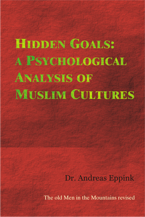by Dr. Andreas Eppink
revised edition of The old Men in the Mountains

One may be tempted to quickly dismiss fanatics or terrorists, yelling and boasting political leaders with the throwaway thought that “those people are insane.” But their sanity is not the issue with which we are dealing. Crazy or not, dismissive judgment of them will not lead to an understanding of their basic psychological makeup – and this understanding is critical if one hopes to effectively battle terrorism. To change things, armed forces – just like terror and spreading hatred – have very limited effectiveness.
The contemporary Muslim world seems a depressive society, in conflict with its own feelings of sorrow, mutual distrust, humiliation, impotence and fear, each facet of which results in intolerance.
In essence, cultures differ from one another. The analysis of cultures in terms of Hidden Goals can be of assistance in understanding those differences. With this understanding we can elucidate why religious and political conflicts may arise and whether they can be solved or not. Not in every culture is the Hidden Goal religious order as dominant as in Muslim cultures. However, this does not mean that in the Muslim world the Hidden Goal religious order prevails everywhere and always. Cultural and sub-cultural differences are the outcome of different Hidden Goal combinations. Hidden Goals have their own ranking in a culture.
In “drawing board states” like Afghanistan, Iraq, Libya, Syria, Yemen, or many other countries in the world, people following strong opposing Hidden Goals are obliged to live together. We have to accept that these people can never live in peace with one another if their differences are not dealt with. These differences cannot simply be bridged by “democracy.” Often only some kind of regional of self – governance can avoid (further) conflicts. A golden rule to bear in mind is: the central state concept will only be accepted with hard feelings, if at all, where independence and freedom predominate, and stability is low in the Hidden Goals’ ranking. Opposing concepts on government make it improbable that the Western (Jeffersonian) concept of democracy will solve the social-economical problems in many of these regions. Here, alliances and treaties are the way to build communities.
This book concludes with recommendations concerning interventions and change, control and administration, and effective communication.
Muslims and non-Muslims must engage themselves through the vigorous promotion of information and knowledge. Long-range planning should include the founding of new scientific institutes to educate young Muslims with tolerant Muslim ideals. Those institutes have the potential to become great houses of broad and tolerant knowledge, like it has been in the old days before the ijtihad (independent thinking) was closed.
Buy on Amazon.com